How are you?
Good? Good! You’re here because you want to ask How are you in Korean.
This is a super-important question to know.
You’ll learn 10 ways to ask it and you will also learn how to respond in Korean.
Sound good? Good!
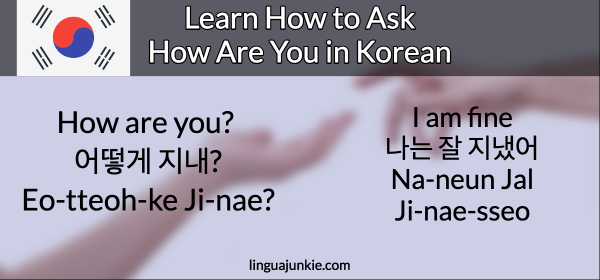
Part 1 – Formal Vs Informal
First, you know that Korean has two main speech forms, right? Formal and Informal.
- Formal speech [존댓말 ( John-Daet-Mal ) ]
- Formal speech is a polite form of speech that you use when speaking to strangers, elders, or someone of a higher position at work. You must always use formal speech in the service industry when communicating with customers or clients, or in business settings.
- Informal speech [반말 ( Ban-Mal ) ]
- Informal speech is a speech that you use when talking to friends, family, and to people who are your age or younger. Remember, it is rude to use informal speech when you are talking to strangers, elders, or those of higher position than you at work.
You will learn both ways of asking How are You in Korean.
Part 2 – Audio Lesson to Help You Learn Korean
Want to learn Korean? Here’s an audio lesson (on how to greet others in Korean) that will get you speaking the language.
Just press the play button on the player below.
- Lesson #2 – Greetings – by KoreanClass101
This lesson came from KoreanClass101, a Korean language learning program and website.
Click here to visit KoreanClass101 for more fun & easy lessons.
Part 3 – How to Say How Are You in Korean
1. How are you?
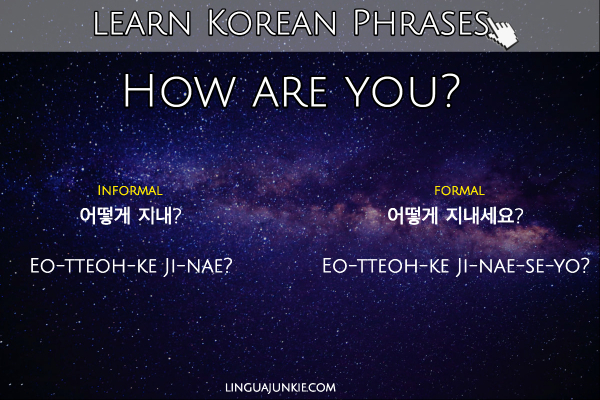
Formal | 어떻게 지내세요? | Eo-tteoh-ke Ji-nae-se-yo? |
Informal | 어떻게 지내? | Eo-tteoh-ke Ji-nae? |
This is the most basic way to ask how are you in Korean.
Do you see the “yo” at the end of the first example?
Sentences written in formal speech often end with ~요(yo).
That’s something you should remember.
Now, let’s break these phrases down. Here are the words you should know.
- 어떻게 (Eo-tteoh-ke) = How
- 지내다(Ji-nae-da) = to spend time or live. You can also use 계시다(Gae-Shi-da) which means the same thing but is only used in formal speech.
- 어떻게 지내세요 in literal translation is ‘how have you been spending your time’, which basically means ‘how are you’.
How can you respond to this question?
Basic Responses
Formal | I am fine | 저는 잘 지냈어요 | Jeo-neun Jal Ji-nae-sseo-yo |
I am not fine | 저는 잘 못 지냈어요 | Jeo-neun Jal Mot Ji-nae-sseo-yo | |
Informal | I am fine | 나는 잘 지냈어 | Na-neun Jal Ji-nae-sseo |
I am not fine | 나는 잘 못 지냈어 | Na-neun Jal Mot Ji-nae-sseo |
Here are the words you should know.
- 잘(jal) = well.
- 못(Mot) = bad.
- 하다(Ha-da) = to do.
- So for example, if you say 잘하다(Jal-ha-da), it means ‘to do something well’.
- If you write 못하다(Mot-ha-da) it means ‘to do something poorly/badly’.
- 잘 지냈어요 means ‘have been doing well’
- 저 (Jeo)= ‘I/Me’ used in formal speech
- 나 (Nah)=’I/Me’ used in informal speech
Now that you know how to ask How are You in Korean, let’s learn some other variations.
You can ask someone how they’ve been in Korean.
2. How have you been?
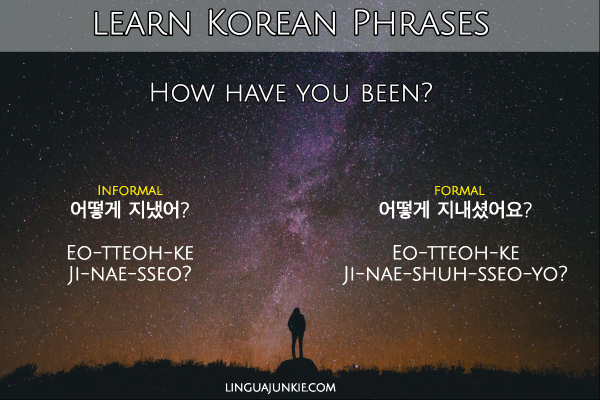
Formal | 어떻게 지내셨어요? | Eo-tteoh-ke Ji-nae-shuh-sseo-yo? |
Informal | 어떻게 지냈어? | Eo-tteoh-ke Ji-nae-sseo? |
Advanced Responses
Formal | I am So-so | 저는 그저 그렇게 지냈어요 | Jeo-neun Geu-jeo Geu-reo-keh Ji-nae-sseo-yo |
How about you? | 당신은요? | Dang-shin-eun-yo? | |
Informal | I am So-so | 나는 그저 그렇게 지냈어 | Na-neun Geu-jeo Geu-reo-keh Ji-nae-sseo |
How about you? | 너는? | Neo-neun? |
Words to know:
- 당신 (Dang-shin) = ‘You’ used in formal speech.
- 너 (Neo)= ‘You’ used in informal speech.
- 그저 그래 (Geu-jeo-geu-rae) = so-so
3. Have you been well?

Want to know if they’ve been doing well? Use these Korean questions.
Formal | 안녕히 계셨어요? | An-nyoung-hee Gae-shuh-sseo-yo? |
Informal | 잘 있었어? | Jal it-sseot-sseo? |
Words to know:
- 안녕히 (Ahn-nyoung-hee) means the same thing as 잘 (Jal);
- It which means well/good, but 안녕히 (Ahn-nyoung-hee) is only used in formal speech.
- 계시다(Gae-Shi-da) = to spend time or live. This word has the same meaning as ‘지내다’ (Ji-nae-da), but 계시다 (Gae-shi-da) is only used in formal speech.
- 있었어 = to be (standard past tense)
Answering this question is simple. You can say either yes or no.
Basic Responses
Formal | Yes | 네 | Nae |
No | 아니요 | Ah-ni-yo | |
Informal | Yes | 응 | Eung |
No | 아니 | Ah-ni |
Words to know:
- 네 (Yes/ok) – used only in formal speech
- 아니오 (No) – used only in formal speech
- 응 (Eung/ok) – used only in informal speech
- 아니 (No) – used only in informal speech
4. Have you been well? (2)
Formal | 안녕히 지내셨어요? | An-nyoung-hee Ji-nae-shuh-sseo-yo? |
Informal | 잘 지냈어? | Jal Ji-naet-sseo? |
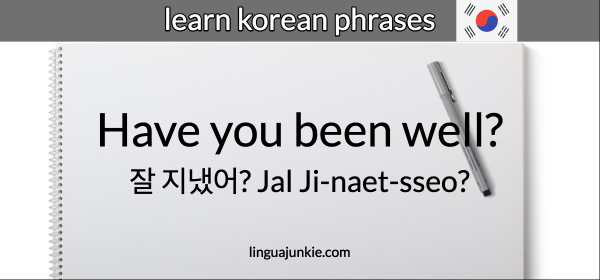
Advanced Responses
Formal | I’ve been busy | 저는 바쁘게 지냈어요 | Jeo-neun Ba-bbeu-gae Ji-naet-sseo-yo |
Informal | I’ve been busy | 나는 바쁘게 지냈어 | Na-neun Ba-bbeu-gae Ji-naet-sseo |
Words to know:
- 바쁘다(Ba-bbeu-da) : Busy
5. Have you been well? (3)
With this specific question, you want to know if they have been well during the time you two have been apart.
Formal | 그동안 잘 계셨어요? | Geu-dong-ahn Jal Gae-shut-sseo-yo? |
Informal | 그동안 잘 있었어? | Geo-dong-ahn Jal It-sseot-seo? |

Words to know:
- 그동안 (geu-dong-ahn) = in the meantime
- 그동안 잘 계셨어요? Means ‘have you been well in the meantime (while we haven’t seen each other)’?
- Basic Responses
Formal | Yes, I have been very well | 네, 저는 잘 지냈어요 | Nae, Jeo-neun Jal Ji-nae-sseo-yo |
Informal | Yes, I have been very well | 응, 나는 잘 있었어 | Eung, Na-neun Jal Ji-nae-sseo |
6. Have you been well? (4)
The following questions are asking whether any significant events or incidents have happened in the meantime ever since the last time you saw each other.
‘Have you been well (without any significant events/incidents)?’
Formal | 그동안 별 일 없으셨어요? | Geu-dong-ahn Byul Il Ub-eu-shut- sseo-yo? |
Informal | 그동안 별 일 없었어? | Geu-dong-ahn Byul Il Ub-seo-sseo? |

Words to know:
- 별 일(Byul Il) means any events, incidents.
- 없다 = to not exist
- 별일 없다 = There isn’t any significant events/indicents/happenings.
Basic Responses
Formal | No, I am fine (without any events/incidents/happenings) | 아니요, 저는 별일 없었어요 | Ah-ni-yo, Jeo-neun Byul Il Ub-sseot-seo-yo |
Informal | No, I am fine (without any events/incidents/happenings) | 아니, 나는 별일 없었어 | An-ni, Na-neun Byul Il Ub-sseot-seo |
7. What have you been up to?
Formal | 뭐하고 지내셨어요? | Mwo-ha-go Ji-nae-shut-sseo-yo? |
Informal | 뭐하고 지냈어? | Mwo-ha-go Ji-naet-seo? |

Words to know:
- 뭐(Mwo) = What
Advanced Responses
Formal | I have been learning Korean | 저는 한국어를 공부하며 지냈어요 | Jal Ji-naet-seo-yo |
I have been learning English | 저는 영어를 공부하며 지냈어요 | Jal Mot Ji-naet-seo-yo | |
Informal | I have been learning Korean | 나 한국어 공부하며 지냈어 | Jal Ji-naet-seo |
I have been learning English | 나 영어 공부하며 지냈어 | Jal Mot Ji-naet-seo |
Words to know:
- 공부(Gong-bu) = study
- 하다 – to ~(verb)
- 공부하다 (Gong-bu-ha-da) = to study
8. Long time no see!
Formal | 오랜만이에요 | Oh-raen-man-e-eh-yo |
Informal | 오랜만이야 | Oh-raen-man-e-ya |
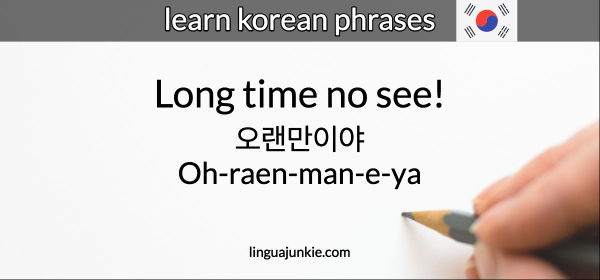
Words to know:
- 오랜만 (Oh-raen-man) means ‘after a long time’.
- 오랜만이에요/오랜만이야 means ‘It’s been a long time (since we haven’t seen each other). It is an expression you use when you are greeting someone you haven’t seen for a long time.
Responses
Formal | Yes, It’s been a long time! | 네, 오랜만이에요! | Nae, oh-ren-man-e-eh-yo |
Informal | Yes, It’s been a long time! | 응, 오랜만이야 | Eung, Oh-ren-man-e-ya |
9. I missed you!
You’re right, this is not a literal “How are you in Korean” phrase. But, you would say this when greeting someone, right? And, if you miss them, you do want to know how they are now, right? So, you can use it too.
Anyway, knowing how to say I miss you in Korean is important too.
Formal | 보고싶었어요 | Bo-go-ship-uh-sseo-yo |
Informal | 보고싶었어 | Bo-go-ship-uh-sseo. |
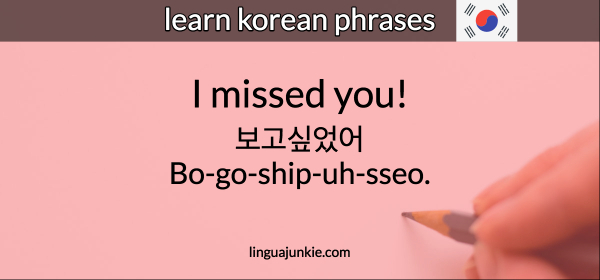
Words to know:
- 보고싶다 (Bo-go-sib-da) means ‘I miss you’.
How can you respond if someone tells you they miss you?
Formal | Me too! | 저도요! | Jeo-do-yo! |
Me too, I missed you! | 저도요, 저도 보고싶었어요! | Jeo-do-yo, Jeo-do Bo-go-sip-peu-sseo-yo | |
Informal | Me too! | 나도! | Na-do! |
Me too, I missed you! | 나도, 나도 보고싶었어! | Na-do, Na-do Bo-go-sip-peu-sseo |
Words to know:
- 도(Do) that comes after a noun means ‘too/as well’.
- 저도=Me too/as well (in formal speech)
- 나도 = Me too/as well (in informal speech)
10. Have you eaten?
This is also not an exact “how are you in Korean” phrase. Seems strange right?
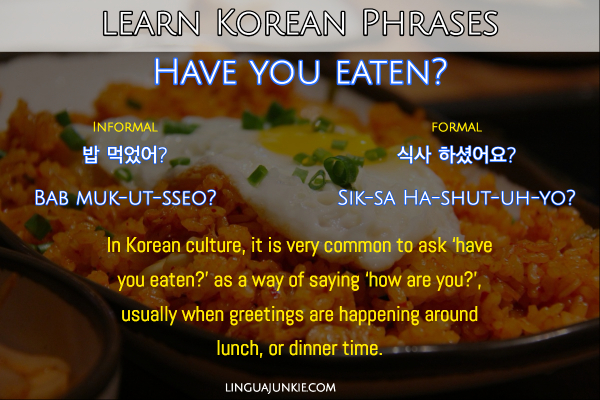
In Korean culture, it is very common to ask ‘have you eaten?’ as a way of saying ‘how are you?’, usually when greetings are happening around lunch, or dinner time. ☺
Formal | 식사 하셨어요? | Sik-sa Ha-shut-uh-yo? |
Informal | 밥 먹었어? | Bab muk-ut-sseo? |
Words to know:
- 밥(Bab) = Rice/Meal (Informal speech)
- 식사(Sik-Sa) = Meal (Formal speech)
- 먹다 = to eat
Let’s answer this question.
Formal | Yes, I have | 네, 먹었어요 | Nae, muk-uht-seo-yo |
No, not yet | 아니요, 아직이요 | Ah-ni-yo, ah-jik-e-yo | |
Informal | Yes, I have | 응, 먹었어 | muk-uht-seo |
No, not yet | 아니, 아직 | An-ni, ah-jik |
Words to know:
- 아직 (Ah-jik) = Not yet.
Now you are ready to ask people how they are in Korean!
Plus, you also know how to respond if I ask you how you are.
☺
Leave a comment down below and tell me how you care.
– The Main Junkie
P.S. I highly recommend this for Korean learners. If you REALLY want to learn Korean with effective lessons by real teachers – Sign up for free at KoreanClass101 (click here) and start learning!

I wish u can answer this plssss
I wanted to ask which dialect\accent did u use( of Korean ) I want to learn the soeul direct or standard dialect
[…] Aside from the literal meaning of asking someone if he/she had already eaten, this is also the Korean cultural way of saying how are you in Korean. […]